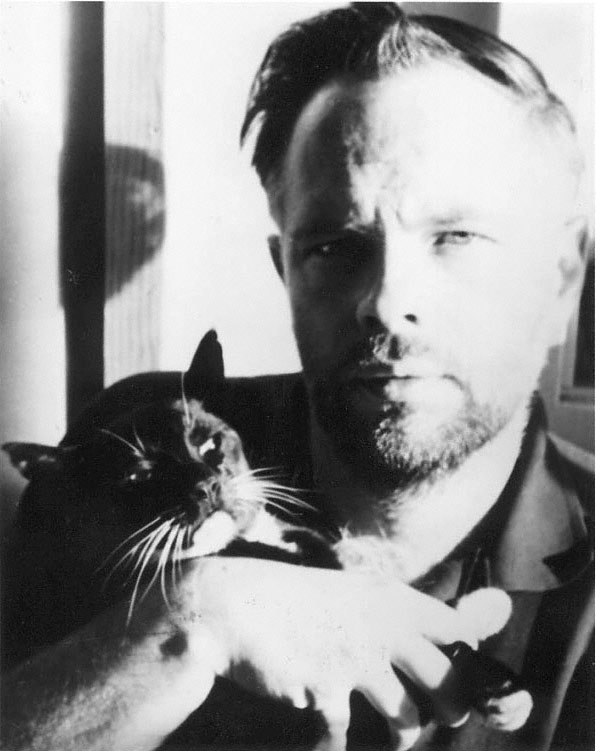Being Philip K. Dick
Jaime Kleiman takes you behind the scenes of Workhaus Collective's latest production, "800 Words," an intriguing stage adaptation of Philip K. Dick's life, written by 2008 McKnight grantee, Victoria Stewart




What do quantum physics, alternative universes, and a talking cat have in common? If you’re playwright Victoria Stewart, the answer is Philip K. Dick. Stewart’s newest work, 800 Words: The Transmigration of Philip K. Dick, opens this Thursday at the Playwrights’ Center. It’s a delightfully elliptical, darkly funny piece about the famed science fiction author and presumed crackpot.
800 Words begins in 1982, shortly before Dick’s death, at a time when he began having religious visions that dramatically affected his work. Characters like his dead sister, his fifth wife, and Eastern European spies filter in and out of his consciousness. Sasha, the loquacious cat, is played by a puppet (manipulated by Kimberly Richardson), and serves as a symbol for “the metaphysical heavy lifting,” explains Stewart, who recently received a McKnight grant. “Philip was very into animals (he felt that cats were more empathetic than humans); and he did, in fact, have a cat named Sasha right before he died. I felt like a cat needed to be there to witness everything, the way cats do: at the end [of the play], it turns out she’s kind of been the eye of God trying to bring him to the next level.” About the way the cat’s character was handled for the play, she says, “I think puppetry can be this great metaphor for bodies and souls-puppets are inanimate until someone animates them.”
The play’s title was inspired by author A.E. van Vogt‘s notion — which Dick adhered to — that, in science fiction, something new should happen every 800 words. According to Vogt, every page or so should introduce an innovation to the story: “You had to throw in a new rocket or a vision of the future,” says Stewart. “Philip went by this maxim. He felt really strongly that this was the way to do it.” And the play, too, mirrors Dick’s “crazy” style; time and place change and shift suddenly, much as they do in his novels.
Actor Luverne Seifert, fresh off his run with Ten Thousand Things Theater’s Raskol (a musical adaptation of Crime and Punishment) plays Philip Dick. It’s a challenging role, as he never leaves the stage and carries the bulk of the dialogue. Though Raskol was based on a 19th-century novel, Seifert sees similarities between the two literary plays. Seifert says, “I’ve been trying to get the text in my head, trying to be in two places at once. I think Philip K. Dick, in a way, parallels Raskol,” because both revolve around a person’s effort to be saved and find redemption.
Workhaus Collective serves as producer for 800 Words. A company comprised solely of playwrights, Workhaus was founded in 2005 with the aim of putting the playwright back in the driver’s seat. No longer relegated to the sidelines, a Workhaus production makes sure the playwright is an active force in the rehearsal room, where things can be clarified, edited, or excised on the spot. This ongoing participation by the writer adds lucidity and flexibility to the creative process — the playwright-driven company can create characters suited to specific actors, which in turn makes a play feel more organic, more exciting. 800 Words, with its dream-like and sometimes abstruse plotline, is a perfect example of why Workhaus exists in the first place. If something doesn’t feel right, Stewart can rewrite it. It’s not often that actors get to shape the creation of a character so directly.
This is not to say that 800 Words, much like quantum mechanics or life itself, makes linear sense. “I don’t know if there’s a plot,” laughs Stewart. “Philip is looking at his life as a whole and trying to make sense of it; and he encounters all these strange people along the way.”
In Merriam-Webster, “transmigration” is defined as a verb: “to cause to go from one state of existence or place to another.” Ergo, though he’s long gone from this plane, it’s entirely possible that Dick continues to exist in some parallel universe — one where, perhaps, he gets to see this play. Anything, as he knew, can happen; and it often does. Stewart knows this, too, which is exactly what makes 800 Words so compelling.
Performance details: 800 Words: The Transmigration of Philip K. Dick, presented by the Workhaus Collective, runs May 28 through June 7 at the Playwrights’ Center in Minneapolis. For tickets, call (612) 332-7481, ext. 20.
About the author: Jaime Kleiman is a freelance journalist and actor. She has written for Mpls.St.Paul Magazine, The Rake, Twin Cities Luxury + Fashion, Pioneer Press, Minnesota Meetings and Events, mnartists.org, American Theatre, City Pages, and BackStage.com. As an actor, she has performed, most recently, in How I Learned to Drive with Workhouse Theatre Company in north Minneapolis.